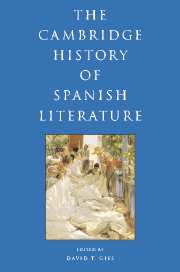Book contents
- Frontmatter
- I INTRODUCTION
- II HISTORY AND CANONICITY
- III THE MEDIEVAL PERIOD
- IV EARLY MODERN SPAIN: RENAISSANCE AND BAROQUE
- 7 Renaissance and Baroque: continuity and transformation in early modern Spain
- 8 Religious literature in early modern Spain
- 9 Renaissance poetry
- 10 The antecedents of the novel in sixteenth-century Spain
- 11 Miguel de Cervantes
- 12 The making of Baroque poetry
- 13 The development of national theatre
- 14 Lope Félix de Vega Carpio
- 15 Pedro Calderón de la Barca
- 16 Didactic prose, history, politics, life writing, convent writing, Crónicas de Indias
- V THE ENLIGHTENMENT AND NEOCLASSICISM
- VI THE FORGING OF A NATION: THE NINETEENTH CENTURY
- VII THE MODERN, MODERNISMO, AND THE TURN OF THE CENTURY
- VIII TWENTIETH-CENTURY SPAIN AND THE CIVIL WAR
- IX IN AND OUT OF FRANCO SPAIN
- X POST-FRANCO SPANISH LITERATURE AND FILM
- Bibliography
- Index
- References
16 - Didactic prose, history, politics, life writing, convent writing, Crónicas de Indias
from IV - EARLY MODERN SPAIN: RENAISSANCE AND BAROQUE
Published online by Cambridge University Press: 28 March 2008
- Frontmatter
- I INTRODUCTION
- II HISTORY AND CANONICITY
- III THE MEDIEVAL PERIOD
- IV EARLY MODERN SPAIN: RENAISSANCE AND BAROQUE
- 7 Renaissance and Baroque: continuity and transformation in early modern Spain
- 8 Religious literature in early modern Spain
- 9 Renaissance poetry
- 10 The antecedents of the novel in sixteenth-century Spain
- 11 Miguel de Cervantes
- 12 The making of Baroque poetry
- 13 The development of national theatre
- 14 Lope Félix de Vega Carpio
- 15 Pedro Calderón de la Barca
- 16 Didactic prose, history, politics, life writing, convent writing, Crónicas de Indias
- V THE ENLIGHTENMENT AND NEOCLASSICISM
- VI THE FORGING OF A NATION: THE NINETEENTH CENTURY
- VII THE MODERN, MODERNISMO, AND THE TURN OF THE CENTURY
- VIII TWENTIETH-CENTURY SPAIN AND THE CIVIL WAR
- IX IN AND OUT OF FRANCO SPAIN
- X POST-FRANCO SPANISH LITERATURE AND FILM
- Bibliography
- Index
- References
Summary
Court, language, and empire in the age of Charles V
During the rule of Charles V, Spanish literature achieves an international dimension through the work of Archbishop Fray Antonio de Guevara (1474–1546). His attempt to connect with a new reading public outside restricted humanistic groups accounts for Guevara’s immense popularity in Spain and Europe, and makes him into a writer who paved the way for the modern essay and the novel. Guevara’s chosen topics are usually entrenched in Renaissance culture, but their didacticism becomes subverted by a lighthearted demeanor, the use of apocryphal sources, or the overwhelming presence of rhetorical devices. Menosprecio de corte y alabanza de aldea (“Contempt for Life at Court and a Praise for Life in the Country,” 1539) exemplifies his ability to play with a constellation of motives mainly stemming from the medieval controversies about courtly life. Here the author’s argumentation annuls the traditional dichotomy announced in the title; his apparent diatribe against the court in favor of country life finally contains a somewhat resigned admission that, with all its evils, only the court grants a certain degree of individual autonomy.
Other authors depart from Guevara’s rhetorical self-consciousness. Juan de Valdés (1510–1541) wrote in Italy the Diálogo de la lengua (“Dialogue About Language”), which confirms the rise of the vernacular Castilian language as a vehicle of culture. By defending the autonomy of his native language, Valdés aligns himself with Pietro Bembo (1470–1547) or Baldassare Castiglione (1474–1529), who in different ways reveal a similar concern for the Italian language. In Spain, the Gramática de la lengua castellana (“Grammar of Castilian Language,” 1492), written by Antonio de Nebrija (1444?–1522) constitutes a key reference, but, unlike Nebrija, Valdés follows a non-prescriptive approach.
- Type
- Chapter
- Information
- The Cambridge History of Spanish Literature , pp. 283 - 290Publisher: Cambridge University PressPrint publication year: 2005



